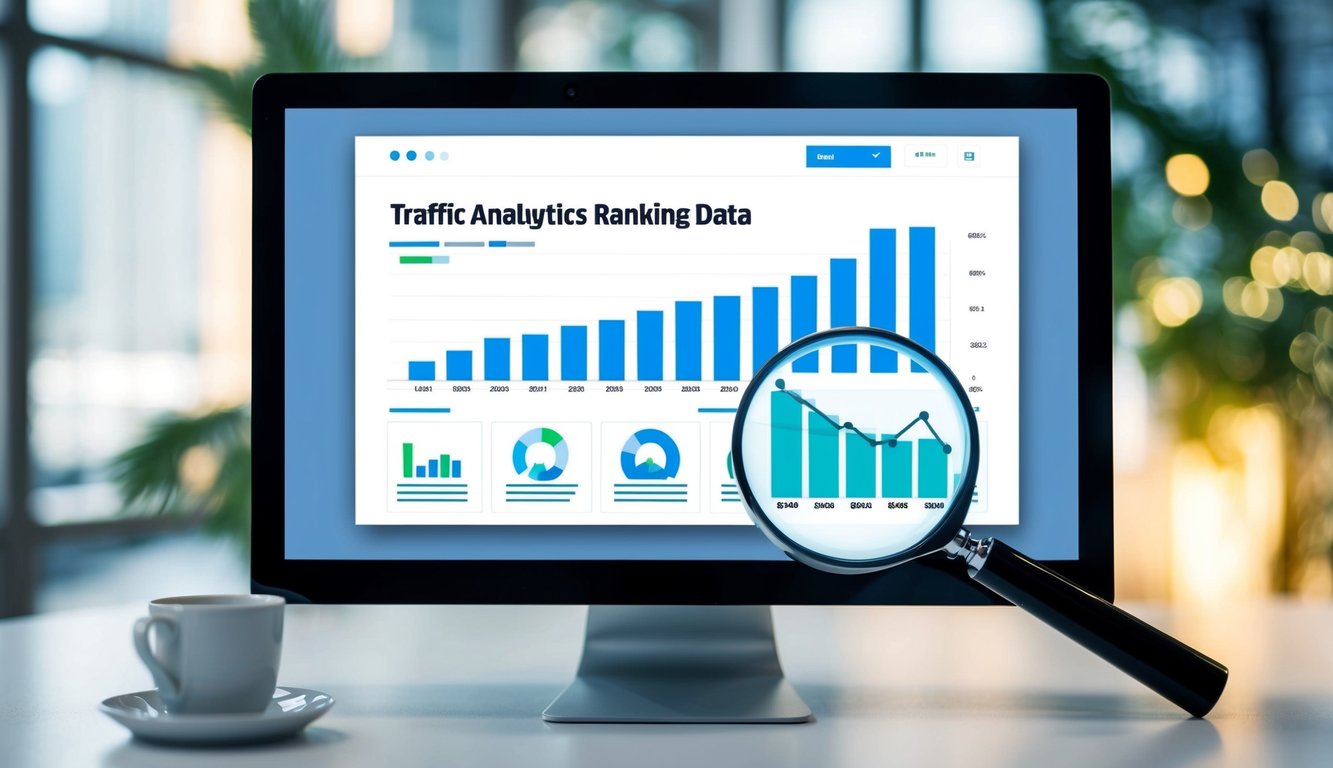The Role of SEO in Enhancing Online Visibility for Businesses
In a world where everyone is shouting for attention, how do you ensure your business gets heard?
SEO plays a pivotal role in enhancing online visibility for businesses. It’s not just about sprinkling keywords like fairy dust; it’s about crafting a well-oiled machine that drives your presence to the forefront of search results.
If you’re looking to boost your brand awareness and rope in those elusive clicks, then paying attention to SEO is non-negotiable.

You’ll find that understanding and implementing nuanced SEO strategies can elevate your digital presence from forgotten to unforgettable.
From the impact of content marketing to the mighty power of link building, elements of SEO can be as impactful as they are indispensable.
Measuring your success is an ongoing journey, one that demands an arsenal of tactics and a commitment to staying ahead of the curve.
Want those practical insights to enhance your digital footprint? Stick around as we dive into the exciting world of SEO strategies that have turned brands into household names and offer actionable tips for doing the same. It’s not rocket science — it’s just smart marketing.
Key Takeaways
- SEO is essential for boosting online visibility.
- Content marketing and link building are key strategies.
- Measuring success requires ongoing effort.
Understanding SEO and Its Importance
Imagine your business is a needle in the internet haystack. Search Engine Optimization (SEO) is your magnet, making your business visible amid the digital noise.
This section will explore the mechanics of SEO, its relevance for businesses, and its dynamic evolution over the years.
What is SEO?
SEO, or Search Engine Optimization, is like the personal trainer for your website, enhancing its form to get it to the top of the search results page. It’s the practice of optimizing various elements of your site to attract organic traffic from search engines.
From adjusting on-page elements like meta tags and headlines to mastering complex tactics like link building, SEO covers a broad spectrum. It ensures your website is as appealing to search engine algorithms as it is to human visitors.
Search engines evaluate factors like speed, mobile-friendliness, and quality content to determine where your website ranks.
Theres no one-size-fits-all magic trick here. It’s a tailored effort involving technical tweaks and strategic use of keywords, all working together to promote visibility and traffic. If you’re aiming for that top spot on Google, solid SEO practice is essential.
Why SEO Matters for Businesses
Picture this: you have the most amazing product, but no one knows it exists. This is where SEO comes into play, making sure your fabulous offerings aren’t just your best-kept secret.
SEO is a critical component for driving organic traffic to your business website.
Search engines drive substantial traffic, delivering potential customers right to your virtual doorstep. Effective SEO means a higher ranking, which leads to increased visibility and more potential clicks. Higher search rankings enhance credibility, implying your business is reliable and trustworthy in the eyes of consumers.
Given such importance, businesses cannot afford to neglect an optimized SEO strategy. When a customer performs a search relevant to your product, you want your business to flash brightly in the spotlight.
The Evolution of SEO
Ah, SEO — constantly shape-shifting like a digital chameleon. It started with simple keyword stuffing and has grown into a more sophisticated discipline.
Google’s Panda, Penguin, and Hummingbird updates revolutionized the industry, penalizing spammy practices while rewarding genuine, high-quality content.
Think of SEO as an ever-evolving dance, with Google’s algorithm changes setting the rhythm. The shift toward mobile search, voice queries, and video content continues to push SEO into new terrains.
As SEO evolves, businesses must keep pace, adapting to new trends and technologies to stay competitive. Embrace the change, or risk being left in the dust by savvy competitors who know how to play the SEO game well.
Key SEO Strategies for Boosting Online Visibility
If you think keywords are the magic beans of SEO, then congratulations—you’re not totally wrong. But don’t let the simplicity fool you.
Combine keyword optimization with tactical on-page, off-page, and technical SEO, and you might just have your hands on the recipe for elevated online presence without going down the rabbit hole.
Keyword Optimization
So, you’re thinking keyword optimization is just stuffing a page with trendy buzzwords, right? Oh, bless your heart.
The trick is finding those elusive keywords that your audience is actually searching for. Use tools like Google Keyword Planner or Ahrefs. Aim for a mix of high-volume and long-tail keywords that align with user intent.
Sprinkle them strategically in your headers, content, and meta tags. Don’t overdo it, though. Google’s smarter than that.
Monitor their performance and tweak as necessary. Remember: It’s the relevance, not the repetition, that makes your content golden in the eyes of search engines.
On-Page SEO Techniques
Ah, the art of on-page SEO, where the devil truly is in the details.
Focus on creating content that’s both engaging and optimized. Use header tags to structure your information logically. This not only aids crawling but also creates an inviting user experience.
Be wary of keyword stuffing—Google detests it, and users aren’t far behind.
Emphasize internal linking. Connect related content within your site to keep users engaging with your brand longer. Oh, and make sure your URLs are clean and descriptive. Clarity and relevance make those search engine spiders dance with joy.
Off-Page SEO Techniques
Off-page SEO isn’t just about getting likes or shares. It’s about earning the right connections that define your digital clout.
Quality backlinks are crucial, so aim to feature in reputable domains within your niche. And no, buying links with your rainy day fund isn’t a wise investment.
Public relations and guest blogging are excellent strategies. Foster relationships with influencers who resonate with your brand. You can check out effective ways to collaborate on platforms or influencer partnerships have become essential. This not only builds authority but also diversifies your traffic sources.
Technical SEO
Welcome to the realm of technical SEO, where perfectionists make things happen behind the scenes.
Ensure your website is mobile-friendly. No one wants to zoom in and out like they’re on a treasure hunt for content. Google’s algorithms certainly favor sites that play nicely on a smartphone.
Another must is fast loading times. Yep, if your website takes more time to load than it does to microwave a burrito, you’ve got a problem.
Incorporate schema markup to improve how your site’s data is displayed—those eye-catching rich snippets could be your new best friend. Get these ducks in a row, and you’ll see a notable bump in visibility.
The Impact of Content Marketing on SEO
Imagine a world where your business is just invisible, floating in the internet abyss. How tragic, yet so true for many businesses.
This is where content marketing steps in, swooping you above the tidal waves of obscurity into the sunshine of SEO visibility. Perfecting your content game will not only charm search engines but will also seduce users by connecting with their deepest desires.
Creating High-Quality Content
Here’s the thing: search engines adore content that’s both juicy and nutritious for users. Quality beats quantity every single time.
High-quality content is your ticket to a better search engine ranking. It’s not just about stuffing keywords but about crafting valuable pieces that resonate with your audience.
Google’s algorithms are smart; they know when you’re trying to cheat the system. So, put your effort into creating content that’s engaging and informative.
Include compelling storytelling, accurate data, and visuals to make it shine. Articles should answer questions, solve problems, or entertain. That way, users stay longer on your page, signaling to search engines that your content’s genuinely useful.
Content Relevance and User Intent
User intent is the holy grail of SEO perfection. If your content matches the user’s real query, then bravo! You’re on the right path.
The art lies in deciphering what users want when they type something into a search engine.
Crafting content that aligns with user intent requires a nuanced understanding of your audience’s needs. It’s like being the Sherlock Holmes of SEO—figuring out not just what users search, but why.
Address these wants and needs with precision. Keeping content relevant to these queries ensures that users find what they’re truly looking for, increasing engagement and reducing bounce rates.
The Role of Blogs, Articles, and Other Content Types
It’s the golden age of blogging and article writing. Say goodbye to cookie-cutter content and hello to diverse content types like blogs, ebooks, infographics, and videos.
Each has a pivotal role in boosting that SEO magic. For instance, blogs and articles help in keeping your site fresh.
Diversifying your content means you cater to different audience preferences. Some are readers, others are visual learners—cater to them all. These variations expand your reach and improve your chances of backlinking as people love sharing content that’s engaging and visually appealing.
The Power of Link Building

Link building is a critical component in boosting your site’s SEO performance. High-quality backlinks not only improve search engine rankings but also strengthen a website’s authority and visibility.
Understanding Backlinks
So, what’s in a backlink, you might ask? Well, think of backlinks as virtual high-fives from other sites. They are the hyperlinks on one website that point to your site, essentially vouching for its credibility and relevancy.
Search engines like Google view these links as indicators of trust. More quality backlinks boost your search visibility.
It’s not about sheer numbers; the real value lies in securing links from authoritative sites, which signals to search engines that your content is trustworthy and worth recommending.
Strategies for Effective Link Building
Creating a compelling blog post and hoping for the best isn’t enough. You must actively pursue link-building strategies.
First, focus on crafting quality content that people naturally want to link to. Engage in outreach to industry influencers and bloggers, suggesting mutually beneficial link exchange or guest posts.
Use analytical tools to identify broken links on popular sites in your industry and propose your content as a replacement. Remember, link building is as much about relationship building as it is about SEO gains.
The Role of Guest Posting and Partnerships
Guest posting—your secret weapon in link building—is about writing articles for other websites with links back to your own. While some might consider it just another marketing tactic, it’s far more impactful, enhancing relationships and establishing authority in your niche.
Seek out websites with shared audiences, and offer content that adds genuine value. Partnerships work similarly, though here the focus is broader.
Collaborate with businesses or influencers for joint content, interviews, or events. These strategies facilitate organic link building and expand your network in the process.
Measuring SEO Success

Ever wondered if your SEO efforts are really paying off, or are you just blindly throwing spaghetti at the wall to see what sticks?
Well, it’s time to shine a light on those murky waters and bring some clarity with meticulous tracking and analysis.
Key Metrics to Track
Let’s cut to the chase: not all metrics are created equal.
For starters, organic traffic is the lifeblood of any SEO campaign. It’s about quality, not just quantity.
Clickthrough Rate (CTR) plays a crucial role too; a high CTR means people find your page irresistible. Then there’s the good old SERP visibility, which is your rank among competitors.
Oh, and let’s not forget bounce rate. High bounce rates could mean your site’s about as appealing as a to-do list. User engagement metrics also matter, showing how irresistibly engaging your content is.
Email marketing and social media can play a surprising role here, complementing your efforts in delightful ways. Measuring how these areas contribute can provide a fuller picture of your digital landscape.
Tools for Monitoring SEO Performance
Ah, the age of technology has graced us with tools that simplify our lives—or at least, our SEO monitoring.
Google Analytics should be your first love; it’s like your relationship counselor, telling you what’s working and what needs a divorce.
Pair this with Google Search Console for insights straight from the search engine itself.
For those who want to dig a bit deeper into local performances, tools like MOZ Local can be quite insightful.
Analytics platforms such as SEMrush and Ahrefs can also take your performance measurement game to a new level, allowing deep dives into keyword tracking and competitor analysis.
Analyzing and Adjusting Strategies
You’ve got your data, now what? This is where you become the Sherlock Holmes of your SEO world.
By dissecting each metric, you figure out where things are going south. Maybe it’s time to adjust those keywords or improve content quality if engagement is lower than your motivation on a Monday morning.
It’s all about adapting. If something isn’t jiving, change it.
Test different strategies and track the changes; it’s like playing chess, but with less old-timey costumes and more digital prowess.
Tracking doesn’t stop; it’s an ongoing dance—adjust and re-evaluate regularly to ensure long-term success.
Case Studies: SEO Success Stories

Understanding how various businesses achieve SEO success can provide you with a blueprint for your own strategy.
From small businesses to medium-sized enterprises, these case studies reveal how different tactics were employed to achieve significant results.
Small Business SEO Success
Imagine you’re a small business looking to make a mark online. It’s not about breaking the bank; it’s about smart, strategic moves.
Consider an instance where a local bakery increased its online visibility by optimizing for local search terms like “best cupcakes in [city name].” By fine-tuning their Google My Business profile and collecting glowing reviews, they saw a spike in foot traffic and online orders.
Additionally, small businesses have leveraged long-tail keywords to edge out competitors. If you’re selling handmade jewelry, using niche phrases like “artisan silver bracelets” instead of simply “bracelets” can yield fantastic results.
By focusing on quality content and authentic engagement, small enterprises can dramatically boost their online presence.
Medium-Sized Enterprises Competing with Larger Companies
Here’s where the game gets a bit more intense. Medium-sized enterprises often find themselves sandwiched between nimble startups and industry giants. How do you level the playing field? By adopting an SEO approach that highlights what you do best.
Take the example of a regional furniture store that carved out its niche by targeting community-oriented content tailored to local tastes.
Through A/B testing and a focus on user experience design, they improved site speed and mobile rendering. This not only impressed visitors but also earned those all-important brownie points with search engines.
Building authority through guest blogging or content collaborations with industry influencers can also tip the scales in your favor.
Lessons Learned from Successful SEO Campaigns
What can you learn from the SEO successes of others? For starters, it’s all about agility.
Flexibility in strategy allowed these successful campaigns to adapt to algorithm changes. A focus on content that caters to user intent rather than keyword stuffing is vital. Users want useful information, not a keyword salad.
Moreover, investing in strong internal link structures improves your site’s navigation and user experience, potentially translating those clicks into conversions.
And remember, data is your friend. Regular audits and analyses inform better decision-making, ensuring your strategies are as sharp as a tack.
Actionable Insights for Improving Digital Presence

In the fast-paced universe of digital marketing, your business’s online visibility hinges on smart strategies.
By focusing on efficient SEO practices, addressing the needs of business owners, and aiming for sustainable growth, your digital presence can thrive.
Practical Tips for Business Owners
You’ve got a business to run and probably no time to become an SEO expert overnight. Here’s a quick cheat sheet.
Start by ensuring your website’s design remains modern and visually appealing. Outdated designs scream “yesterday,” and that’s not a good look in the fast-evolving digital landscape.
Consider smart keyword integration. Tools like Google Keyword Planner can help you identify powerful industry-specific keywords.
Strategically place these in your content, titles, and meta descriptions. Keep an eye on fast-loading pages and mobile friendliness. In a world glued to smartphones, a mobile-optimized site is a must.
Last but not least, engage with users through interactive content. This is the digital age; static brochures just don’t cut it.
SEO Best Practices for Digital Marketers
Ah, the elusive art of SEO. It’s not just about cramming keywords anymore. Instead, focus on creating high-quality, relevant content that provides value.
Google’s algorithms are getting smarter by the second, learning to prioritize content that truly answers users’ queries.
Use both on-page and off-page SEO techniques to increase visibility. On-page involves optimizing your headings, internal links, and images. Use alt texts to make those images speak (figuratively).
Off-page, on the other hand, revolves around building backlinks from reputable sources. These links signal to search engines that your site is a trustworthy authority in your field.
Oh, and don’t forget the technical stuff: meta tags, XML sitemaps, and robots.txt files are still your friends.
Leveraging SEO for Long-Term Business Growth
Looking to the future, your SEO strategy should focus on sustainability.
SEO is not a one-time trick; it’s an ongoing mission. Regularly update your content and continuously adapt to algorithm changes. This keeps your site relevant and engaging. Think of it as a digital garden; it needs tending to thrive.
Invest in analytics tools to track your website’s performance and user behavior. Data-driven decisions lead to well-informed strategies.
Also, consider local SEO to attract customers right from your neighborhood. A business focusing on growth can’t ignore voice search optimization, considering the rise of smart speakers.
In brief, effective SEO aids in establishing a lasting digital footprint while attracting a steady stream of potential customers.
Conclusion

Congratulations! You’ve reached the end of the rainbow in the SEO for business journey.
Now you know, SEO isn’t just a tool—it’s your secret weapon. You’ve seen competitors play the SEO game, and guess what? So can you.
Need more online visibility? SEO isn’t magic, but it’s pretty close.
When wielded properly, your site can climb search result ranks faster than your coffee disappears on Monday mornings.
Think of SEO as your business GPS. Sure, you can find your way without it. Eventually. But who wants to wander through the digital jungle without a guide?
Use SEO strategies effectively, and you’ll arrive at your desired destination with fewer detours.
Remember those SEO juggernauts? SEO doesn’t work alone. It goes hand-in-hand with social media marketing where engagement happens.
Mix these, and your visibility isn’t just enhanced—it’s supercharged. A strategic partnership worth nurturing.
Let’s face it, ignoring SEO is like ignoring an ever-growing pile of emails in your inbox. You could do it, but eventually, it’s going to catch up with you.
Trust that persistent rank climber, SEO, to take your business places.
So, are you ready to embrace the SEO force? Dive into this world and watch your business grow in digital presence.
Who knew a few well-placed keywords could change your business landscape? Now go, conquer those search engines!